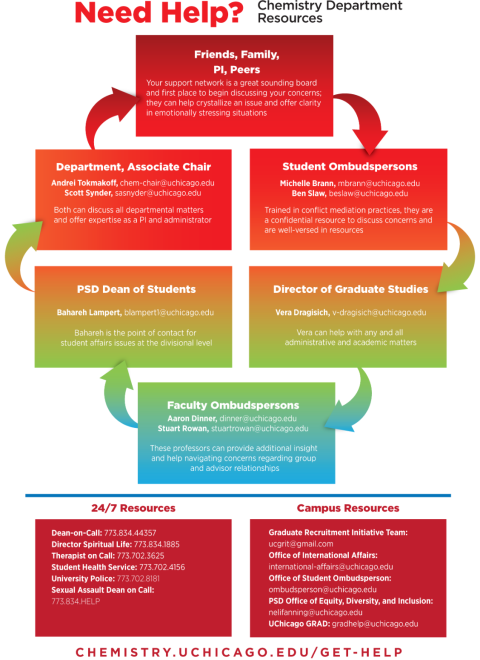Student Ombudspersons
Graduate Student Ombudspersons are a confidential resource to seek advice and discuss problems that they are dealing with. If you are dealing with a challenge of any type and don't know where to turn, Student Ombudspersons are knowledgeable about the resources available to help you. Student ombudspersons complete the Center for Conflict Resolution’s (CCR) 40–hour Mediation Skills Training, and gain additional experience in creative problem solving, interest based negotiation, managing emotionally charged situations, and mediating multi-party disputes. They are equipped to support you in whatever you might need: whether that be a sounding board, formal mediation for larger conflicts, or anything in between.
Contact:
-
Julia Noel (jrnoel@uchicago.edu)
-
Lily Payne Torres (lipayne@uchicago.edu)
-
Katelyn Feuling (kfeuling@uchicago.edu)
Faculty Ombudspersons and the Ombuds Team
Faculty Ombudspersons are the faculty resource available for any member of the Chemistry community to seek advice and help with problems where a faculty member's perspective or involvement can help.
Contact Faculty Ombudspersons:
- Aaron Dinner, dinner@uchicago.edu
- Andrei Tokmakoff, tokmakoff@uchicago.edu
Faculty and Student Ombudspersons, together with the Director of Graduate Studies, form the Department of Chemistry Ombuds Team, work closely together to advise one another, share problem solving ideas, and discuss who is best poised to solve complicated problems.
- Director of Graduate Studies: Vera Dragisich, v-dragisich@uchicago.edu
Chemistry Network of Support
- Friends, Family, PI, Peers: Your support network is a great sounding board and first place to begin discussing your concerns; they can help crystallize an issue and offer clarity in emotionally stressing situations
- The Department provides several confidential resources which work together to provide a network of support
- Student Ombudspersons are a confidential peer resource trained in conflict mediation to help you work through your issue
- Faculty Ombudspersons can help with advisor, research group, and department issues that seem thorny
- Staff Ombudspersons can help with all administrative and academic matters
- Director of Academic Programs & Graduate Studies has lots of experience and has dealt with most any situation graduate students encounter
- Department Chair can be an ally in a difficult situation and help address complicated issues
- Outside of the department, the PSD Dean of Students can assist with all student affairs.
They are here as a resource for you however you decide. That can range from anonymous emails to zoom conversations to larger group discussions. Since all of the conversations are confidential, their role as Ombudspeople is to help you figure out how to address difficult situations and make the most out of your time at the University of Chicago.
No issue is too large or small to discuss! They are always happy to provide an outside opinion or connect you with the appropriate resources to address your concerns. If you also just want someone to listen to you, that's appropriate too!
Ben and Michelle are equipped with mediation training to help facilitate difficult conversations. Additionally, the Ombudsperson team meets Quarterly to discuss larger departmental concerns. Their goal is to act as a conduit for student and postdoctoral input into department affairs and general well-being.
No, unless we have discussed an action plan that involves this (with your permission of course!).
You are always in control of conversations with the Ombuds team. As such, they will confirm what information you feel comfortable disclosing as they discuss potential action plans or resolutions. In the event the situation changes and you no longer want to pursue a specific action plan or you would like to do something else, just let them know. They are always happy to schedule another Zoom call or are accessible via email. They will not do anything without your explicit permission.
Records are kept only with the ombudsperson team member contacted. Additionally, these records are only kept during the quarter in which the case occurs. At the end of the quarter, they will provide an anonymized summary to the Department Chair which will be used to discuss Department wide issues and to assess the Ombuds program. Records are always treated as confidential unless explicitly discussed otherwise.
